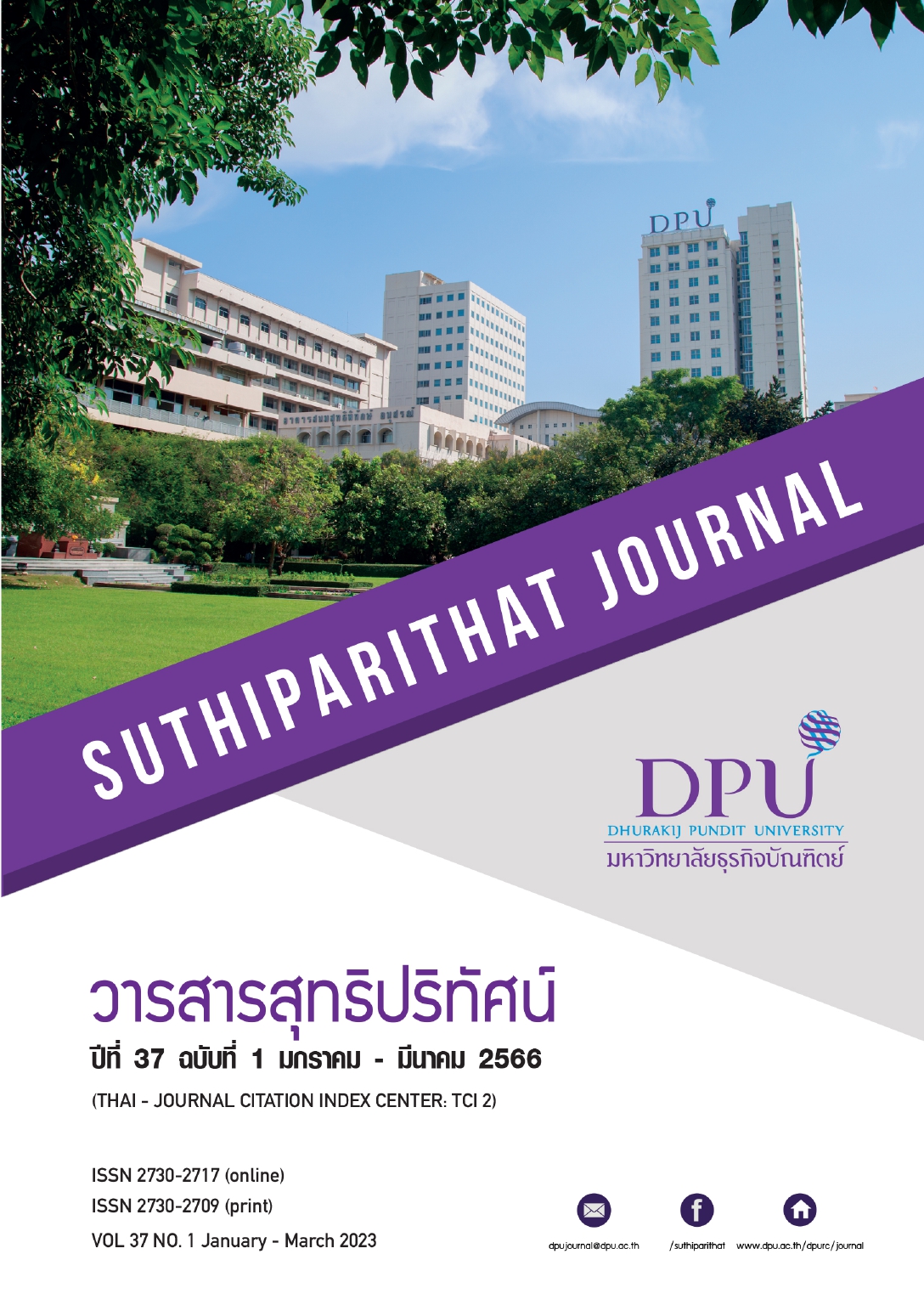ส่วนประสมทางการตลาดบริการ และความพึงพอใจในมาตรการจัดการโรคโควิด-19 ที่มีอิทธิพลต่อความภักดีของลูกค้าในการใช้บริการคลินิกเสริมความงามในจังหวัดเชียงใหม่
คำสำคัญ:
ส่วนประสมทางการตลาดบริการ, ความพึงพอใจในมาตรการจัดการโรคโควิด-19, ความภักดีของลูกค้าบทคัดย่อ
งานวิจัยนี้มีวัตถุประสงค์เพื่อศึกษาส่วนประสมทางการตลาดบริการ และความพึงพอใจในมาตรการจัดการโรคโควิด-19 ที่มีอิทธิพลต่อความภักดีของลูกค้าในการใช้บริการคลินิกเสริมความงามในจังหวัดเชียงใหม่ เป็นการวิจัยเชิงปริมาณโดยใช้แบบสอบถามในรูปแบบออนไลน์ ประชากรที่ใช้ในการศึกษาคือ ลูกค้าทั้งชายและหญิงที่เคยใช้บริการคลินิกเสริมความงามในจังหวัดเชียงใหม่ ในช่วงเดือนมกราคม-มิถุนายน 2565 ซึ่งเป็นคลินิกเสริมความงามในจังหวัดเชียงใหม่ที่ได้ลงทะเบียนมาตรฐานความปลอดภัยด้านสุขอนามัย Amazing Thailand Safety and Health Administration (SHA) และกำหนดขนาดตัวอย่างจำนวน 300 คน โดยใช้ตารางขนาดตัวอย่างของ Seymour Sudman กรณีไม่ทราบจำนวนประชากรที่แน่นอนและเป็นการเก็บตัวอย่างในท้องถิ่น โดยผลการวิจัย พบว่า ส่วนประสมทางการตลาดบริการในด้านผลิตภัณฑ์ ด้านช่องทางการจัดจำหน่าย ด้านการส่งเสริมการตลาด และด้านบุคคล มีอิทธิพลทางตรงต่อความภักดีของลูกค้าในการใช้บริการคลินิกเสริมความงามในจังหวัดเชียงใหม่ ที่ระดับนัยสำคัญทางสถิติ 0.05 และสามารถอธิบายความผันแปรที่มีอิทธิพลต่อความภักดีของลูกค้าในการใช้บริการคลินิกเสริมความงามได้ร้อยละ 86.2 (R2 = 0.862) และความพึงพอใจในมาตรการจัดการโรคโควิด-19 ในด้านการคัดกรองอาการป่วย ด้านการป้องกันโรค และด้านการทำความสะอาด มีอิทธิพลทางตรงต่อความภักดีของลูกค้าในการใช้บริการคลินิกเสริมความงามในจังหวัดเชียงใหม่ ที่ระดับนัยสำคัญทางสถิติ 0.05 อีกทั้งยังสามารถอธิบายความผันแปรที่มีอิทธิพลต่อความภักดีของลูกค้าในการใช้บริการคลินิกเสริมความงามได้ร้อยละ 71.0 (R2 = 0.710)
เอกสารอ้างอิง
การท่องเที่ยวแห่งประเทศไทย. (2563). Amazing Thailand Safety and Health Administration (SHA). https://web.thailandsha.com/index
กัลยา จันทร์สาย, และ ภัครดา เกิดประทุม. (2565). การพัฒนารูปแบบความได้เปรียบในการแข่งขันของธุรกิจคลินิกเสริมความงามในภาคตะวันออกเฉียงเหนือของประเทศไทย. วารสารสังคมศาสตร์และมานุษยวิทยาเชิงพุทธ, 7(9), 329-342. https://so04.tci-thaijo.org/index.php/JSBA/article/view/261348/176877
กัลยา วานิชย์บัญชา. (2551). การวิเคราะห์สถิติขั้นสูงด้วย SPSS for windows (พิมพ์ครั้งที่ 5). จุฬาลงกรณ์มหาวิทยาลัย.
กุณฑลี รื่นรมย์. (2551). การวิจัยตลาด (พิมพ์ครั้งที่ 6). จุฬาลงกรณ์มหาวิทยาลัย.
จับตาตลาดศัลยกรรมความงามหลังเปิดประเทศ. (2564, 15 พฤศจิกายน). กรุงเทพธุรกิจ. https://www.bangkokbiznews.com/social/971782
มนตรี ศรีวงษ์. (2565, 26 กันยายน). จริงมั้ย? ธุรกิจคลินิกความงาม คนในอยากออก คนนอกอยากเข้า. ThaiSMEsCenter. https://www.thaismescenter.com/จริงมั้ย-ธุรกิจคลินิกความงาม-คนในอยากออก-คนนอกอยากเข้า
วรรณี แกมเกตุ. (2551). วิธีวิทยาการวิจัยทางสังคมศาสตร์ (พิมพ์ครั้งที่ 2). จุฬาลงกรณ์มหาวิทยาลัย.
วาสนา แสงทอง, และ รัชดา ภักดียิ่ง. (2564). กลยุทธ์การตลาดเพื่อเพิ่มศักยภาพการแข่งขันของคลินิกเสริมความงามในภาคตะวันออกเฉียงเหนือของประเทศไทย. วารสารสันติศึกษาปริทรรศน์, 9(2), 675-688. https://so03.tci-thaijo.org/index.php/journal-peace/article/view/242157/168850
คลินิกความงาม เชียงใหม่ ที่ไหนดี ปี 2022. (2565). Mybest. https://my-best.in.th/51685
อวัชฎา เหมทานนท์. (2564). คุณภาพบริการ มาตรการป้องกันการระบาดของโรคติดเชื้อไวรัสโคโรน่า 2019 ความพึงพอใจ และความเชื่อถือไว้วางใจที่ส่งผลต่อความตั้งใจไปใช้บริการซ้ำศูนย์การค้าของผู้บริโภคในกรุงเทพมหานคร [การค้นคว้าอิสระปริญญามหาบัณฑิต, มหาวิทยาลัยกรุงเทพ]. DSpace at Bangkok University. http://dspace.bu.ac.th/jspui/handle/123456789/4798
Blog Biz Idea. (2564). ตอนนี้คลินิกเวชกรรมในเชียงใหม่ Supply มากกว่า Demand ยังงัยลองมาวิเคราะห์กันดู. Blockdit. https://www.blockdit.com/posts/604caeadba2c450c07d819c1
Digimusketeers. (2565, 6 ตุลาคม). ชี้เป้า 10 ธุรกิจมาแรง 2022 เริ่มทำธุรกิจให้ปังต้องดูเทรนด์. http://bitly.ws/BffZ
New normal in beauty industry เทรนด์ใหม่ของการเลือกใช้บริการสถานเสริมความงามหลังยุค COVID-19. (2565). Sinota Clinic. https://www.sinotaclinic.com/212/
Aaker, D. (2014). Aaker on branding: 20 principles that drive success. Morgan James.
Hair, J. F. Jr., Babin, B., Money, A. H., & Samouel, P. (2003). Essential of business research methods. John Wiley & Sons.
Keller, K. (2013). Strategic brand management (4th ed.). Pearson Prentice Hall.
Kotler, P. (2016). Marketing management: Analysis, planning, implementation and control (15th Global ed.). Prentice-Hall.
Minarti, S. N., & Segoro, W. (2014). The influence of customer satisfaction, switching cost and trusts in a brand on customer loyalty–The survey on student as IM3 users in Depok, Indonesia. Procedia-Social and Behavioral Sciences, 143, 1015-1019. https://doi.org/10.1016/j.sbspro.2014.07.546
Schroeder, M. A. (1990). Diagnosing and dealing with multicollinearity. Western journal of nursing research, 12(2), 175–187. https://doi.org/10.1177/019394599001200204
Shekhar Kumar, R., Dash, S., & Chandra Purwar, P. (2013). The nature and antecedents of brand equity and its dimensions. Marketing Intelligence & Planning, 31(2), 141-159. https://doi.org/10.1108/02634501311312044
Oliver, R. L. (1999). Whence consumer loyalty?. Journal of marketing, 63(4_suppl1), 33-44. https://doi.org/10.2307/1252099
Waheed, M., Klobas, J. E., & Ain, N. (2020). Unveiling knowledge quality, researcher satisfaction, learning, and loyalty: A model of academic social media success. Information Technology and People, 34(1), 204-227. https://doi.org/10.1108/ITP-07-2018-0345
Yadav, M. K., & Rai, A. K. (2019). An assessment of the mediating effect of customer satisfaction on the relationship between service quality and customer loyalty. IUP Journal of Marketing Management, 18(3), 7-23.
ดาวน์โหลด
เผยแพร่แล้ว
รูปแบบการอ้างอิง
ฉบับ
ประเภทบทความ
สัญญาอนุญาต
ลิขสิทธิ์ (c) 2023 มหาวิทยาลัยธุรกิจบัณฑิตย์

อนุญาตภายใต้เงื่อนไข Creative Commons Attribution-NonCommercial-NoDerivatives 4.0 International License.
เนื้อหาและข้อมูลในบทความที่ลงตีพิมพ์ในวารสารสุทธิปริทัศน์ ถือเป็นข้อคิดเห็นและความรับผิดชอบของผู้เขียนบทความโดยตรงซึ่งกองบรรณาธิการวารสาร ไม่จำเป็นต้องเห็นด้วย หรือร่วมรับผิดชอบใด ๆ
บทความ ข้อมูล เนื้อหา รูปภาพ ฯลฯ ที่ได้รับการตีพิมพ์ในวารสารสุทธิปริทัศน์ ถือเป็นลิขสิทธิ์ของวารสารสุทธิปริทัศน์หากบุคคลหรือหน่วยงานใดต้องการนำทั้งหมดหรือส่วนหนึ่งส่วนใดไปเผยแพร่ต่อหรือเพื่อกระทำการใด ๆ จะต้องได้รับอนุญาตเป็นลายลักษณ์อักษรจากวารสารสุทธิปริทัศน์ก่อนเท่านั้น







